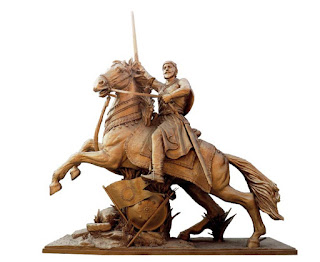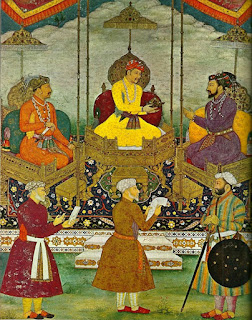Babur /
Mughal Empire
 |
Babur
|
Zahiruddin
Muhammad Babur was the founder of the Mughal Empire in India. He was born on 14th
February A.D. 1483 in Farghana. He was the eldest of three sons of Umar Sheikh
Mirza, a small chieftain of Farghana. The father of Babur was an ancestor of
brave Timur and his mother Qutlugh Nigar Khanam belonged to Mongols. Thus Babur
was born of Turk-Mongol wedlock, hence he had the ferocity of a Mongol and the
courage and ability of a Turk.
Umar
Sheikh Mirza was an ambitious chief and he was not contented with his small
principality of Farghana. He was not having cordial relations with his eldest
brother Ahmad Mirza who was the ruler of Samarkand and Bukhara. He was also
having bad relations with his brothers-in-law, Mahmood Khan and Ahmad. So long
as his father-in-law Yunus Khan survived, none dared attack his territory, but
just after his death his relatives and opponents began to invade Samarkand but
Umar Sheikh Mirza defended his principality bravely.
Tuzuk-i-Baburi
informs us that when Umar Sheikh Mirza was staying at Akhashi, he died in the
prime of his life on June 8, A.D. 1494 as a result of an accident when he was
enjoying pige on-flying and a wooden platform fell upon him due to strong wind.
At the time of the sudden and untimely death of Umar Sheikh Mirza, Babur was
quite young but, being the eldest; he was called upon to resume the
responsibility of the fief of Farghana at the age o f eleven. He not only
inherited the fief of Farghana from his father but also the perpetual rivalries
and conflicts with his kith and kin who were ruling over the neighboring regions of Farghana.
Just
after resuming power, Babur endeavored to safeguard Farghana with the help of
his grandmother Aisan Daulat Begum and other faithful officials. First of all
Babur tried to make Ahmad Mirza agree
for a treaty as he was prepared to act as a Feduatory of Ahmad Mirza but his
proposal was rejected outright by Ahmad Mirza and he had to retreat without
waging war against Babur. It added to the power, prestige and popularity of
Babur.
Babur,
the young and energetic ruler of Farghana, was very much anxious to establish
his sway over Samarkand which once had been the imperial capital of his
ancestors. He was a man of strong will and firm determination.
Babur was
an ambitious person, so he could not be contented with his rule over the
kingdom of Kabul for a long time. He failed to achieve great success in Central
Asia, so he directed his attention to India. He had already heard the stories
of the riches and wealth of India, and conquest of Kabul brought him close to
Indian Territory. Hence he decided to invade India as and when an opportunity came
his way. Before making an invasion against India Babur once again consolidated
his army.
After
devastating the Afghans and establishing his control over Pubjab, Babur marched
upon Delhi. The unsatisfied nobles of the court of Ibrahim Lodi also sent promises
of secret assistance to him. It is also stated that Rana Sanga of Mewar also
sent an invitation to him for a joint invasion of Delhi. Babur was very much
pleased to receive such invitations as it assured him of his success. Ibrahim
Lodi had well realized that there was no way out except to wage war against the
Mughals, so he sent Hamid Kahan, the Subdear of Hisar Firoza, to check the
enemy but he was defeated by Humayun on February 25, A.D. 1526 Babur felt great
pleasure on this victory and conferred the district of Hisar Firoza on Humayun
and he took this victory as a very good omen for further successes in India.
After the
battle of Khanua, Humayun was dispatched to Kabul for there was possibility of
a rebellion. But Babur was disappointed at Humayun’s failures against the
Uzbegs and he decided to proceed to
Kabul himself and even went up to Lahore but he could not go beyond it
due to his ill-health which was the result of his ceaseless campaigns,
administrative liabilities and drinking excesses. Just a few months before his
death Baur declared Humayun his successor to the throne and asked him to be
liberal towards his brothers and kinsmen. Babur breathed his last on December
26, A.D. 1530 and was buried in Ram Bagh on the bank of river Yamuna in Agra,
but later on, according to his last wish, his body was taken to Kabul and
buried on the side of a hill near Kabul, a place of his own choice.




0 टिप्पणियाँ:
एक टिप्पणी भेजें
THANKS FOR YOUR COMMENTS
टिप्पणी: केवल इस ब्लॉग का सदस्य टिप्पणी भेज सकता है.